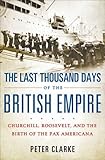Looking for Churchill's "Sunlit Uplands" - Review of "The Last Thousand Days of the British Empire"
 The Last Thousand Days of the British Empire: Churchill, Roosevelt, and the Birth of the Pax Americana by Peter Clarke
The Last Thousand Days of the British Empire: Churchill, Roosevelt, and the Birth of the Pax Americana by Peter ClarkeMy review
rating: 3 of 5 starsClarke writes a quite effective summary of Anglo-American relations from the Quebec Octagon Conference in September 1944 through the end of the Raj in India and the referral of the Palestinian Mandate to the UN in August 1947. The author relies heavily on primary source materials - mainly diaries of major political players and their courtiers as well as extensive mining of contemporary newspaper articles and opinion polls. The war in Europe dominates the narrative, not reaching V-E Day and the Potsdam conference until three quarters of the way through the book. The Pacific Theater and Far East (beyond India) receive surprisingly little attention in my mind (although Canada does get more attention than I'd expect).
 The main focus of this book however is on what Winston Churchill called "the most unsordid act in the history of any nation," the Lend-Lease Act. By shipping supplies from America's "Arsenal of Democracy" to the front lines in Britain, this act served to keep the British war effort afloat, especially through the years before the U.S. entered the war.
The main focus of this book however is on what Winston Churchill called "the most unsordid act in the history of any nation," the Lend-Lease Act. By shipping supplies from America's "Arsenal of Democracy" to the front lines in Britain, this act served to keep the British war effort afloat, especially through the years before the U.S. entered the war.I'm a little bit of two minds about this book. First, I was clearly not the intended audience. Clarke is clearly a Brit writing for a British audience. This is seen in both the vocabulary and especially in references to British political figures with the clear assumption that the reader would know of their reputation during and after the period of time being examined. While I'm an amateur WWII history buff, I'm not an Oxford historian versed in the academic debates and various theories why the British Empire dissolved. Therefore the Introduction and Epilogue especially seemed to be defending the book against attacks that I have never truly seen.
The most interesting, and at times frustrating, facet of this book is the economics. I'd heard plenty about how Lend-Lease saved Britain (and even propped-up the Soviet Union in her hour of need), but I hadn't thought much about how (if at all) the US got those loans back. I'd thought even less about how such a massive flow of aid and armaments would distort the British economy to the point that peace would bring almost the same level of economic hardship as the Blitz. The problem is that I'm just not well enough versed in Keynesian macroeconomics to understand the difference between hard and soft currencies and how the advent of convertability of British pound sterling to US dollars would hurt Britain. Maybe this is a failing in my education, but it is also a red flag for those readers not in academia.
Overall, I was happy to read a book covering this period that wasn't shackled to the story of the Crusade in Europe and the inevitable Cold War to follow. Here is a story (or rather the epilogue to a story) that easily straddles those two narratives and gives some vital insight into two conflicts (Israeli-Palestinian and India-Pakistan) that are currently dominating the narrative of the twenty-first century.
View all my reviews.
Labels: Britain, Lend-Lease, Review


2 Comments:
Great review of what seems to be a difficult book! I probably wouldn't understand it, but it does sound interesting.
I've posted your review on War Through the Generations. Thanks for taking part in the challenge!
--Anna
Diary of an Eccentric
It's too bad that this seems to be directed at a more academic and more British audience - it sounds like a fascinating book covering a period of change that I find very interesting.
Post a Comment
<< Home